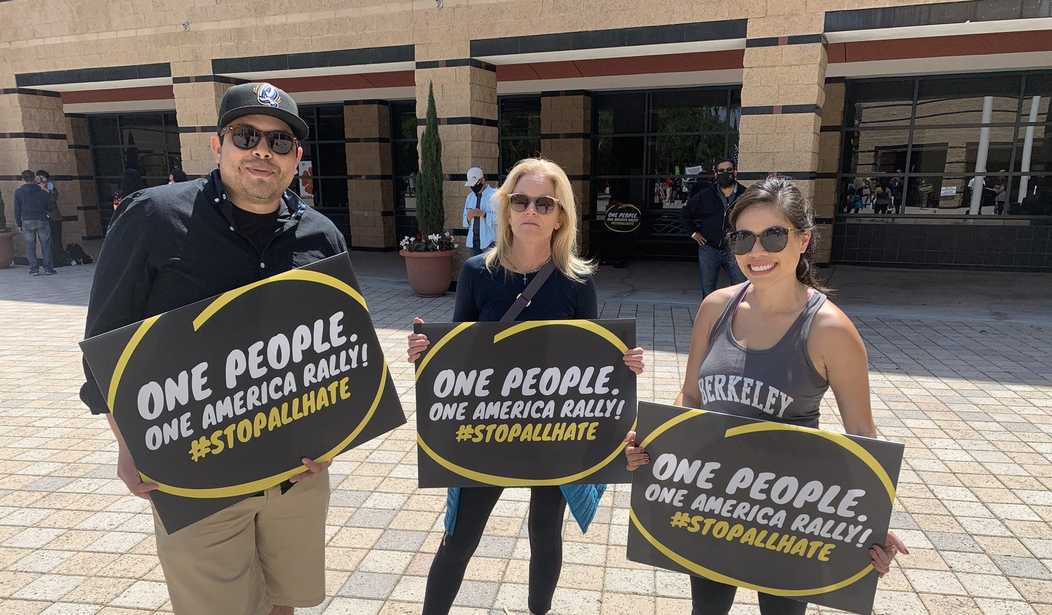I recently threw a rally in Orange County, California for #StopAsianHate with a strong emphasis on supporting law enforcement. We even held it right by the Irvine Police Department as a symbolic show of solidarity with those who keep us safe, who risk their lives, and these days their reputation, to protect us in the community. Before the rally began, my co-organizer James Mai and I shared our experiences in advocating for what we believe are effective, practical solutions. We have been shocked how the very simple solution of empowering law enforcement to address the crimes experienced by Asians is suddenly controversial. Instead, many seem to think that rallies and slogans and “criminal justice reform” will solve the problem.
Rule of law should not be political, yet, in this day and age, it is. The saddest part is that there’s an extra layer of racism happening. It cannot be overlooked that these horrifying and unconscionable hate crimes are disproportionally being perpetrated against women and elderly Asians — targets such as Ee Lee, the 35-year-old Wisconsin woman who was brutally raped and murdered, being left to die after leaving an early evening job. These victims could be our grandparents, sisters, wives, and daughters.
In Southern California, one of the most diverse communities on the globe, we still have our own issues. In 2011, a movement began to push leniency and compassion towards criminals. The result has actually tracked with a documented significant increase in crime. In a press release issued by Criminal Justice Legal Foundation President Michael Rushford, he compared crimes reported in 1992 with 2011, when there was tougher sentencing for habitual felons. There were 932,996 (45%) fewer of the seven major crimes, 190,681 (55%) fewer violent crimes, and 2,129 (54%) fewer murders. “That’s almost one million fewer victims when we were enforcing tough sentencing,” he wrote.
2011 was the exact year that repeat offenders did not receive increased sentences and “low-level” crimes, such as property theft or drug offenses had reduced sentences. These policy changes created a situation where many theft and drug crimes were not even being reported. Asians are naturally more quiet and less willing to dwell on these transgressions, moving on with their lives. As such this only compounded the creation of a culture of fear and complacency, not only in the inner cities but also suburban enclaves like Cerritos, where my truck was robbed in 2016 and found in Compton 12 days later. I was told this was a commonplace situation.
Our Asian families work so hard to provide that almost all members of our household work. We are gone most of the day, and we cherish the little time we can spend together. The last thing we want is to come home and find our personal possessions and everything we worked so hard for, destroyed or stolen. This is the case in many cities like Diamond Bar, Arcadia, and Cerritos, which have become the targets of criminals learning that Asians are distrustful of banks to the point that they keep cash hidden under mattresses.
I watched as those communities pulled together to fight crime, though. Asians didn’t just cry foul. They installed cameras on the streets and worked together on neighborhood watches, and pushed back on some of the crimes.
Why are we not looking at real solutions like this? A victim agenda is not productive. Instead, we need to be proactive to prevent others from becoming future victims. We need to be victors and talk about practical solutions. Solutions such as partnering with those in law enforcement, as with Los Angeles County Sheriff Alex Villanueva’s community task force which has purposefully engaged different ethnic communities to understand the nuances between Asian, Latino, black and white neighborhoods. Sheriff Alex Villanueva has endorsed the recall of Los Angeles District Attorney George Gascon because Sheriff Villanueva knows that not prosecuting crime is not equivalent to reducing crime.
A one-size-fits-all approach clearly doesn’t work. We have seen this with the long-term trend, and also with the immediate results since Gascon began issuing his dangerous directives. According to CBS, on March 4, 2021, barely two months since the start of the year, the number of people wounded in LA shootings already jumped 141 percent from the entire 2020.
Gascon refuses to prosecute crimes, especially misdemeanors, many of which were once classified as felonies. None of this is to the benefit of the average law-abiding citizen, but instead, it empowers criminals. This is clearly highlighted in California’s new proposed law, SB-82, which seeks to push the limits of what is considered “petty theft.” Sorry, but many of us, especially recent Asian immigrants with no wealth or connections, consider $1,000 to be a fortune. It is not petty by any means.
Most importantly, for the Asian community, in LA County, hate crimes towards Asians have doubled. Yet, Gascon specifically declined to file hate crime enhancements, treating them as an ordinary crime. These include a bomb threat to the Japanese American National Museum. A glass bottle was thrown at a jogger in the Mid-Wilshire area with the statement “Your people brought the coronavirus. Go back to your country!”
Democrats, Republicans, and Independents can all agree that we need to stop Asian hate, but let’s really think about what that means practically. A bunch of slogans will get us nowhere, but true “tough on crime” measures will be most impactful.
Can we put our partisan differences aside to advocate for tougher-on-crime measures, so we can reduce these senseless deaths and attacks? That would be one concrete step towards solving the problem.
Marc Ang is the President of Asian Industry B2B a Southern California conservative activist, and is working on his book “The Minority Retort.” As a thought leader in the Asian community, he has been quoted extensively by national and local media outlets, such as the New York Times, Washington Post, Fox News, CBS, NBC, ABC, and many more.














Join the conversation as a VIP Member